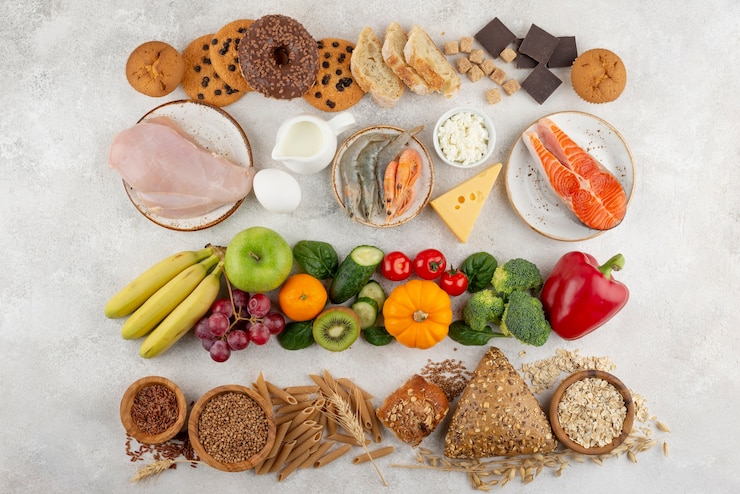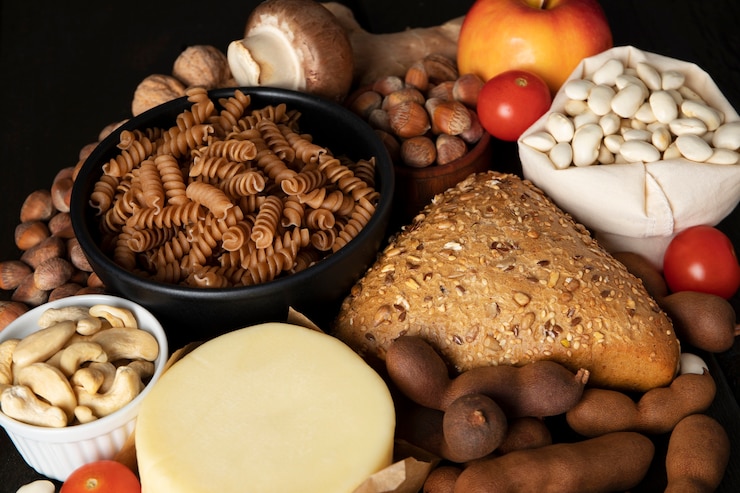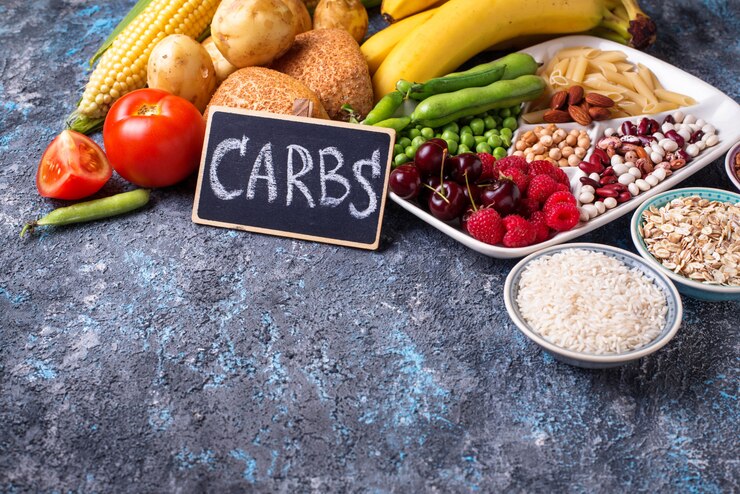Whether you love them or hate them, carbs are a vital food. These materials, which are made up of carbon, hydrogen, and oxygen, power several body processes. Long-term abstinence from them may pose health risks, even though you can theoretically survive without them. Previous studies have suggested that prolonged carbohydrate fasting may result in adverse effects such as cardiac arrhythmias, osteoporosis, renal damage, elevated risk of cancer, reduced physical activity, and abnormalities related to lipids. Furthermore, it would be challenging to completely exclude carbohydrates because they are included in many common foods.

Food molecules called carbohydrates are what provide your body and brain energy by storing it. One example is fiber. In case you’re on a low-carb diet, your body will discover alternative methods to generate energy.
Supply Energy for Day-to-Day Operations:
As you may know, there are four calories in every gram of carbohydrates. Furthermore, what are calories? Energy, naturally. Your cells, particularly the brain, red blood cells, and nerve cells, depend on carbohydrates for much-needed energy. Following a meal containing carbohydrates, your body breaks down the carbs into glucose, often known as blood sugar, which is then transformed by your body into the energy molecule ATP. You can carry out your everyday tasks with the necessary energy if you have enough ATP.
Energize Your Mind:
As previously mentioned, your brain prefers to run on carbohydrates. In reality, the brain uses half of the body’s total energy derived from sugar since it contains so many nerve cells.Otherwise said, your brain enjoys carbohydrates. For this reason, poor consumption of these macros may cause cognitive disturbances such as weariness, irritation, or brain fog.
This does not, however, imply that consuming excessive amounts of any type of carb (such as those found in sweets and highly processed foods) is a good idea. According to research, eating more complex carbohydrates—whole grains, fruits, and vegetables—correlates with better memory and aging of the brain in a healthier way than consuming more simple sugars, which are linked to lower cognition levels.
Fuel Workout:
Carbs are like fuel for your body when it comes to workout. Running, riding, and swimming are examples of aerobic exercises that cause your body to break down glucose quickly for energy. Then, since these macronutrients restore your glycogen stores, carbohydrating after your workout helps you recuperate. (These are the stores of carbohydrates that your body maintains in your liver and muscles.) In this manner, your body will have the stamina to persevere the next time you work out.
Stored for Additional Energy:
You can use your glycogen stores for other purposes besides working out. When your blood sugar falls between meals or during a fast, for example, your body can “withdraw” more glucose from this compressed form of the carbohydrate. Consuming carbohydrates on a daily basis helps your muscles and liver store a healthy amount of glycogen.
Reservable Protein:
The body can utilize protein as fuel if needed, but it would much rather not since protein serves so many other vital functions, such as tissue repair and muscle growth. The body “spares” protein for other, more important functions when it can use carbohydrates as fuel.
Control Your Blood Sugar:
Your body does the intricate dance of keeping your blood sugar levels in check all the time. Your body converts carbohydrates into glucose, which enters the blood, each time you ingest a food that contains carbohydrates. The pancreas then secretes insulin, which permits glucose to enter cells and supply energy to them.

Blood sugar levels can rise by consuming large amounts of carbohydrates, particularly the simple form found in meals like white sugar and refined grains. Blood sugar levels can rise dangerously high in individuals with disorders such as insulin resistance, pre-diabetes, or diabetes due to excess carbohydrate intake. Those who suffer from these conditions must therefore continue to be mindful of their carbohydrate consumption.
Muscle is preserved by carbohydrates. Your body stores glycogen, which is only one of the ways it ensures it has enough glucose for all of its needs.Muscle can also be broken down into amino acids and transformed into glucose or other substances to produce energy when glucose from carbohydrates is scarce.
This is obviously not the best situation because muscle cells are essential for movement of the body. A increased risk of death and poor health have been linked to severe decreases of muscle mass (3Trusted Source).
They support healthy digestive systems:
Digestion of dietary fiber does not provide glucose, in contrast to starches and sugars.Rather, this kind of carbohydrate goes through the body without being broken down. Fiber can be divided into two primary categories: soluble fiber and insoluble fiber.Oats, legumes, the insides of various fruits, and vegetables all contain soluble fiber. It absorbs water as it goes through the body and turns into a gel-like material. This helps to soften and increase the size of your stool, which facilitates simpler bowel motions.
Soluble fiber was found to increase frequency of bowel movements and improve stool consistency in individuals with constipation, according to a review of four controlled studies. Additionally, it lessened pain and straining related to bowel motions (5Trusted Source).
Insoluble fiber, on the other hand, helps relieve constipation by giving your stools more volume and accelerating their passage through the digestive system. Whole grains, as well as the peels and seeds of fruits and vegetables, contain this kind of fiber.A higher consumption of insoluble fiber was linked to a 37% lower incidence of diverticular disease, a condition in which pouches form in the intestine, according to an observational study including nearly 40,000 males (6Trusted Source).
Are these processes dependent on carbohydrates?
As you can see, carbohydrates are involved in a number of crucial functions. But your body can do many of these functions without the need of carbohydrates in other ways.Your body can use fat to produce the fuel molecule ATP in almost every cell. Triglyceride molecules, which are kept in fat tissue, are actually the body’s primary source of stored energy rather than glycogen.
The brain nearly solely uses glucose as fuel most of the time. But in periods of extended fasting or extremely low-carb diets, the brain switches from using glucose as its primary fuel source to ketone bodies, or ketones.Molecules called ketones are produced when fatty acids are broken down. When there are no carbohydrates available to provide your body the energy it needs to function, your body produces them instead.
When the body creates a lot of ketones for energy, it enters a state known as ketosis. This state differs greatly from ketoacidosis, a consequence of uncontrolled diabetes, and is not always deadly.But even though the brain uses ketones as its main fuel during famine, the brain still needs glucose from other sources in the body and muscle breakdown to make up around one-third of its energy (14Trusted Source).
The brain significantly lessens the quantity of muscle that must be broken down and converted to glucose in order to produce energy by employing ketones rather than glucose. This change is an essential survival strategy that enables people to go for weeks without eating.
Promote Gut Health:
Did you know that one kind of carb is fiber? (And a very beneficial one, too?) Eating a lot of fiber helps your digestion stay in check, reduces the chance of constipation and diarrhea, and supports the growth of healthy gut flora. A healthy microbiome can lead to a host of advantages for your health, such as stronger immunity and a decreased chance of inflammatory diseases.
What Is My Daily Need for Carbs?
Since every person’s physiology is different, there is no ideal daily carbohydrate intake. The Food and Nutrition Board of the Institute of Medicine has established an acceptable macronutrient distribution range, which states that 45–65% of total daily calories should come from carbs.

By calculating your total calories by 0.45-0.65 and dividing the result by 4, you can get your optimal range of carbohydrates based on your daily calorie objective (because there are 4 calories per gram of carbohydrates). For instance, on a diet of 2,000 calories per day, 45–65% of the calories should come from carbohydrates, or 900–1,300 calories, or 225–325 grams daily.
Selecting the Correct Carbs:
The terminology used to describe “good” and “bad” carbohydrates can be a little ambiguous. Simple carbohydrates, or those with shorter chemical chains, are often thought of as “bad,” whereas complex carbohydrates, or those with longer chains, are generally thought of as “good.” But there are benefits to both simple and complex carbohydrates.
Simple carbs, such as those found in refined grains and table sugar, give off a rapid energy boost that is beneficial for boosting blood sugar levels or supplying energy for physical activity. On the other hand, simple carbohydrates can cause blood sugar to surge and fall, increasing triglyceride levels and making you feel hungry and lethargic.Six Moreover, a lot of foods high in simple carbohydrates aren’t particularly nutrient-dense. (Consider candy bars, croissants, and white spaghetti.)
Conversely, dietary fiber helps complex carbs to break down more slowly, resulting in steady, steady energy levels. Starchy vegetables such as maize, peas, and sweet potatoes, as well as whole grains like whole wheat bread, pasta, and beans, include these. However, you won’t experience the almost instantaneous energy boost that comes from simple carbohydrates.
Conclusion:
Despite being demonized as bad or obese, carbohydrates are the macronutrient that most people require the most out of the three. These carbon, hydrogen, and oxygen chains serve a variety of biological purposes. Getting adequate of them from wholesome foods improves rather than harms your health.











1 thought on “10 Reasons Why Carbs Are Essential for Health”